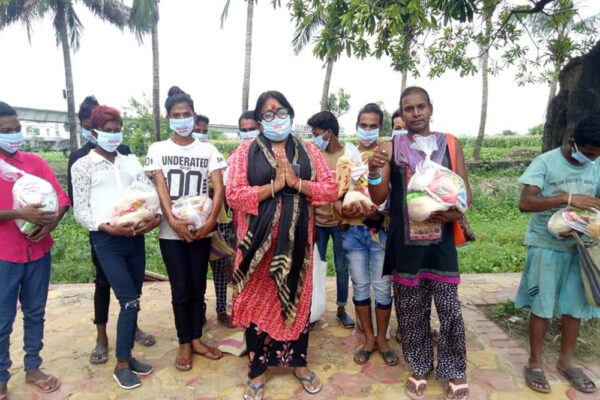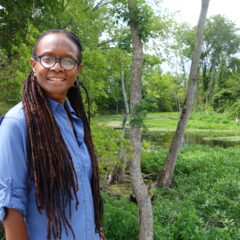This article was originally published in Religion News Service, with the support of CRCC’s global project on engaged spirituality.
KOLKATA, India (RNS) — Well past midnight one day in late June, Ranjita Sinha, a transgender activist based in this city of nearly 15 million, arranged packets of rice, lentils, cooking oil, medicines and biscuits in her dimly lit drawing room. Fastening the packets with red paper hearts, she surveyed her pile of supplies.
“We’ll be distributing 1,000 packets tomorrow among the poor and destitute,” said Sinha, who has been campaigning for the rights of sexual minorities in India over the last two decades. “COVID has derailed our lives and pushed us further to the margins.”
Sinha, 45, was at the forefront of the movement for the recognition of transgender as a third gender in India. In a landmark 2014 ruling, the Supreme Court not only granted trans people the right of self-determination but ordered the government to provide key amenities, including job quotas and education, as it would with any other minority.
In her fight for transgender rights, Sinha’s campaigned for housing rights and skill development programs designed to draw India’s transgender population into the mainstream. Traditionally venerated as beings apart from society, but increasingly ostracized, transgender Indians often resort to sex work and other marginal employment. Sinha has stood by those affected by syphilis, HIV and other sexually transmitted diseases.
Now, as unemployment and threats to health care coverage have been exacerbated by the coronavirus pandemic, Sinha has summoned her support networks to keep the community’s still fledgling hopes alive.
To contain the spread of the coronavirus, India’s ruling Bharatiya Janata Party government, led by Prime Minister Narendra Modi, imposed a severe nationwide lockdown in March. Despite these measures — which put particular pressure on the poor and minorities — more than 700,000 cases and 17,400 deaths have been reported across India, with actual figures suspected to be much higher. Government and private-sector jobs programs lapsed even as unemployment skyrocketed. Transgender people, who tend to be daily wage workers, have lost their livelihoods, food and shelter.
“Many transgenders have fallen into penury or gone back to sex work and begging,” said Sinha.
In pre-colonial India, transgender people were believed to be demigods and were sought out for blessings, especially during religious ceremonies. Their fortunes have declined since the 19th century, when India’s colonial rulers disempowered the community with restrictive laws.
“We feel the same way now,” said Sinha. “The pandemic is a window to all the discriminations we’ve faced over centuries, and my fight is essentially to end these and change people’s perceptions.”
To address the immediate problem of hunger, Sinha co-founded Transgender Kitchen, which provides meals for struggling families and low-income transgender people in Kolkata who lack access to cooking equipment or food itself. The organization also provides masks, sanitizers and other supplies to nearly 2,000 households each month.
With donations from friends and corporate groups, Sinha has been distributing more food and medical supplies to transgender people affected by the pandemic in the region around the city as well. She wears mask, but it’s not easy to maintain social distancing protocols in remote and congested areas, and last month she was hospitalized with suspected COVID-19 symptoms.
With transphobia common among medical professionals, obtaining access to ordinary medicine can be a traumatic experience for transgender people, but Sinha has also lobbied the government to improve transgender health care. Sex reassignment surgery and hormone replacement therapy are out of reach for most. With the stress the pandemic has caused on hospitals, transgender people have had to share either male or female wards, leaving many further traumatized.
Sinha’s appeals to the central and state governments recently spurred the West Bengal state government to allot separate beds for trans COVID-19 patients at a government hospital in Kolkata. Trans Indians are now hopeful that better health care for the community will percolate to the district and village levels.
Bappaditya Mukherjee, the founder of a youth development organization in Kolkata, said Sinha’s work will help break prejudices against the third gender more broadly and spur civil society to think more inclusively about transgender Indians.
“There are doctors working on equal access to health care and patient safety now,” said Mukherjee. “Since the outbreak of the pandemic, Sinha has not only spotlighted the health of sexual minorities, but has also mobilized civil society to contribute food and basic utility items.”
Sinha has also advocated for safe shelters, mental health and housing rights for the victims of domestic abuse and gender-based violence.
“I’ve received over 100 distress calls since the lockdown because there are such few experts on gender-based violence,” she said. “I’ve counseled those whose heads have been tonsured (a mode of social humiliation), who’ve been brutalized and subjected to correctional rapes at home.”
“Ranjita has put her life at risk by reaching out to those in the remotest parts of the state. She is a powerful bridge between the government and community support groups,” said Dr. Subhrojyoti Bhowmick, who heads the state’s first private health clinic for transgender people. The clinic was inaugurated in February in Kolkata.
Bhowmick called Sinha “a fighter with a sensitive soul.”
Sinha grew up in a traditional family in Kolkata and faced victimization, harassment and violence for her gender identity. In 1996, she started a support group to raise awareness about HIV/AIDS and safe sex in the transgender community and in 2006 she started the Association of Transgenders in Bengal to campaign for equal access to health, jobs and education. Since winning recognition for the third gender, she has focused on improving their health and socioeconomic status.
A practicing Hindu, Sinha calls herself an “unrelenting humanist” who opposes any division on the basis of caste, religion, gender or social status. “The coronavirus has fueled communal polarization, violence and intolerance against minorities. So it’s critical to work for a society that’s built on love, harmony and inclusion,” she said.
Soon after the outbreak began, a Sunni Islamic missionary organization in Delhi was accused by the Hindu nationalist government of intentionally spreading the coronavirus; its members were charged for flouting quarantine rules, and rumors of a “Muslim virus” were pedaled widely.
Sinha condemned this scapegoating and turned to the scholarly works of the 19th-century Indian monk and social reformer Swami Vivekananda for inspiration. “Swami Vivekananda said each soul is potentially divine and the goal is to manifest this divinity within by controlling one’s nature — both internal and external. That is the purpose of religion,” she said.
Sinha organized religious festivals not as exclusive gatherings but as social platforms to connect with people across families, cultures and traditions. The pandemic brought these events to a halt, but she has since poured her energy into social media campaigns to boost the transgender community’s fragile health and economic prospects.
“The pandemic has united us all,” she said. “The support I’ve received from Hindus, Muslims, Christians, Jains, Buddhists and Sikhs has restored my faith in humanity.”
Click here to read the story on religionnews.com.
Priyadarshini Sen is a journalist fellow with the Spiritual Exemplars Project.









